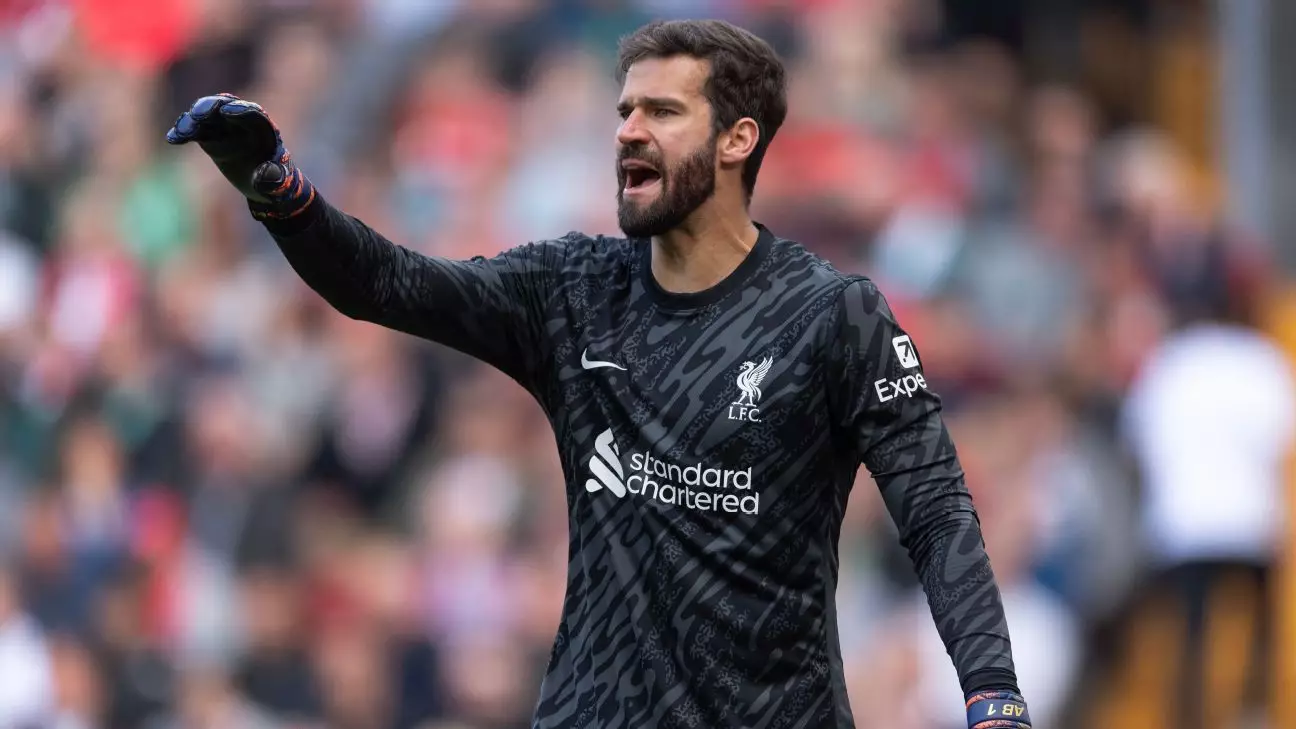As the Premier League season unfolds, Liverpool faces a significant test this weekend as they prepare to encounter Bournemouth. However, a persistent concern looms over the squad: Alisson Becker’s fitness. The renowned Brazilian goalkeeper, who has proven crucial to Liverpool’s defensive line, is currently considered an injury doubt. Manager Arne Slot addressed media inquiries regarding Alisson’s status in a press conference on Friday, emphasizing that the player’s situation is rather delicate.
Alisson has been pivotal in Liverpool’s recent performances, having started all four Premier League matches this season and accumulating three clean sheets. His contributions also included an impactful appearance in the Champions League clash against AC Milan, a match that ended favorably for Liverpool with a 3-1 victory. However, Slot revealed that Alisson’s injury issue predates the Champions League fixture, highlighting potential concerns regarding player workload and recovery.
“Alisson is still a doubt if he can train today. We have to wait and see,” Slot contended. He explained that Alisson has been dealing with a minor muscle issue, which has gradually intensified. The timing of this injury raises questions about fitness management, particularly in a compressed schedule that often sees players facing back-to-back fixtures.
Slot’s comments point towards a broader conversation surrounding athletes’ workloads, which Alisson himself addressed prior to the Milan match. The Brazilian expressed disappointment over the unrelenting demands placed on players, suggesting that their opinions seem to be overlooked when considering fixture congestion. The dialogue between players and managers over such issues is increasingly critical in modern football, as the fine line between competitive success and player welfare continues to be scrutinized.
Slot’s remarks on fixture congestion resonate with a larger narrative in European football, specifically the contrasting demands of playing in the Premier League versus leagues such as the Eredivisie, where he previously managed Feyenoord. He praised the quality of the opposition in England, noting, “The quality of the league, of Nottingham Forest and Bournemouth, is much higher than if you play in Eredivisie against a team not challenging for the top six.” This acknowledgment reflects not only the increased intensity of matches but also the need for deeper squad rotations and tactical adaptability.
The challenge then for Liverpool lies in seamlessly integrating squad rotation while maintaining competitive performance. Slot emphasized the importance of utilizing all available players, especially when experiencing a long season. With this understanding, it becomes imperative for Liverpool to ensure that substitutes like Darwin Núñez, who has yet to make a starting appearance this season, are nurtured and incorporated into the game plan.
Núñez’s situation is indicative of the challenges facing players who require time and opportunity to adapt to a new environment. Despite not having started or scored for Liverpool during the current season, Slot remains optimistic about his trajectory. He drew attention to Núñez’s recent display against AC Milan, emphasizing the necessity for hard work. “He will get his chance in the near future,” Slot assured, acknowledging the depth of Liverpool’s squad and the opportunities that lay ahead.
The narrative surrounding players like Núñez is crucial; it highlights how performance off the bench can contribute favorably towards a collective campaign. Building a resilient squad dynamics where each player understands their role—whether as a starter or substitute—is not just essential but pivotal as the season gradually intensifies.
As Liverpool navigates the challenges of the upcoming fixtures, the focus will undeniably remain on managing player fitness and morale. Alisson’s potential absence is a pressing concern, but it may also serve as a catalyst for further discussions around player welfare within the sport. Furthermore, the integration of players struggling for minutes, such as Núñez, underscores the adaptability required of modern football teams in their quest for success. As the Reds prepare to take on Bournemouth, the narrative is set—one filled with tension, strategy, and the hope that the squad can rally to overcome the hurdles that lie in their path.


Leave a Reply